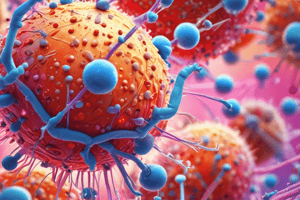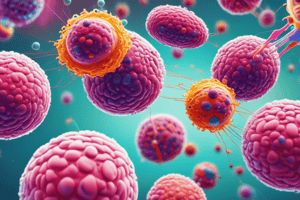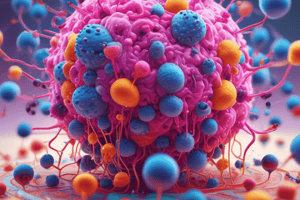Podcast
Questions and Answers
What type of immunity results when exposure to a disease organism or vaccine triggers the immune system to produce antibodies to that disease?
What type of immunity results when exposure to a disease organism or vaccine triggers the immune system to produce antibodies to that disease?
- Passive immunity
- Artificial immunity
- Natural immunity
- Active immunity (correct)
Which type of immunity is provided when a person is given antibodies to a disease rather than producing them through his or her own immune system?
Which type of immunity is provided when a person is given antibodies to a disease rather than producing them through his or her own immune system?
- Passive immunity (correct)
- Natural immunity
- Artificial immunity
- Active immunity
How long can active immunity last?
How long can active immunity last?
- Years or even for the lifetime of the individual (correct)
- Indefinitely
- A few months
- A few weeks
How long does passive immunity typically last?
How long does passive immunity typically last?
Which type of immunity is immunity you develop over your lifetime?
Which type of immunity is immunity you develop over your lifetime?
What is the process of inducing immunity called?
What is the process of inducing immunity called?
Which type of immunity is provided when a person is given antibodies to a disease?
Which type of immunity is provided when a person is given antibodies to a disease?
What type of immunity results from exposure to a disease organism or vaccine?
What type of immunity results from exposure to a disease organism or vaccine?
Which type of immunity is provided by the person's own immune system producing antibodies to a disease?
Which type of immunity is provided by the person's own immune system producing antibodies to a disease?
Why are polysaccharide vaccines commonly conjugated to inactivated proteins?
Why are polysaccharide vaccines commonly conjugated to inactivated proteins?
What is the purpose of conjugating bacterial polysaccharides to a protein in vaccines for patients with weak immune systems?
What is the purpose of conjugating bacterial polysaccharides to a protein in vaccines for patients with weak immune systems?
Which vaccine is recommended for children under 2 years old to prevent S. pneumoniae infection?
Which vaccine is recommended for children under 2 years old to prevent S. pneumoniae infection?
What is the main advantage of mRNA vaccines over other types of vaccines?
What is the main advantage of mRNA vaccines over other types of vaccines?
What is the key ingredient in the Novavax COVID-19 vaccine that helps the immune system respond to the spike protein?
What is the key ingredient in the Novavax COVID-19 vaccine that helps the immune system respond to the spike protein?
Which type of vaccine uses a modified version of a virus that is different from the virus being targeted?
Which type of vaccine uses a modified version of a virus that is different from the virus being targeted?
What is the primary goal of mass immunization strategy?
What is the primary goal of mass immunization strategy?
Which vaccine type is easy and inexpensive to make, and produces strong, long-term immunity?
Which vaccine type is easy and inexpensive to make, and produces strong, long-term immunity?
What is the main difference between the Salk and Sabin vaccines for polio?
What is the main difference between the Salk and Sabin vaccines for polio?
Which vaccine is specifically recommended for travelers at risk of yellow fever?
Which vaccine is specifically recommended for travelers at risk of yellow fever?
When are vaccines contraindicated?
When are vaccines contraindicated?
Which type of vaccine contains a weakened form of the pathogen and can replicate inside the host?
Which type of vaccine contains a weakened form of the pathogen and can replicate inside the host?
What type of immunity is acquired by natural means?
What type of immunity is acquired by natural means?
Which type of vaccine often requires several booster doses and cannot replicate?
Which type of vaccine often requires several booster doses and cannot replicate?
What type of immunity can be produced inside or introduced from outside the body?
What type of immunity can be produced inside or introduced from outside the body?
Which type of vaccine involves toxins treated to destroy the toxic part, retaining antigenic epitopes?
Which type of vaccine involves toxins treated to destroy the toxic part, retaining antigenic epitopes?
What occurs when a sufficient proportion of a population is immune to an infectious disease?
What occurs when a sufficient proportion of a population is immune to an infectious disease?
Which type of vaccine protects individuals directly and prevents spread in the population indirectly?
Which type of vaccine protects individuals directly and prevents spread in the population indirectly?
Which type of vaccine enhances the immune response to antigens by providing 'danger signals' to antigen-presenting cells (APCs)?
Which type of vaccine enhances the immune response to antigens by providing 'danger signals' to antigen-presenting cells (APCs)?
What type of vaccine contains killed microorganisms or inactivated viruses?
What type of vaccine contains killed microorganisms or inactivated viruses?
Which type of vaccine must be conjugated to an inactivated protein to evoke a response in people with weak immune systems?
Which type of vaccine must be conjugated to an inactivated protein to evoke a response in people with weak immune systems?
Flashcards are hidden until you start studying
Study Notes
Vaccines and Immunity: Key Facts
- Passive immunity can be produced inside or introduced from outside the body
- Natural immunity is acquired by natural means, while artificial immunity sources are given for a specific purpose
- Vaccines protect individuals directly and prevent spread in the population indirectly
- Herd immunity occurs when a sufficient proportion of a population is immune to an infectious disease
- There are five general types of vaccines: attenuated, inactivated, subunit, toxoid, and RNA vaccines & viral vectors
- Attenuated vaccines contain a weakened form of the pathogen and can replicate inside the host
- Inactivated vaccines cannot replicate and often require several booster doses
- Adjuvants enhance the immune response to antigens by providing "danger signals" to APCs
- Inactivated whole agent vaccines contain killed microorganisms or inactivated viruses
- Toxoid vaccines involve toxins treated to destroy the toxic part, retaining antigenic epitopes
- Vaccines utilizing pathogen components include subunit, recombinant, polysaccharide, and conjugate vaccines
- Some subunit vaccines must be conjugated to an inactivated protein to evoke a response in people with weak immune systems
Studying That Suits You
Use AI to generate personalized quizzes and flashcards to suit your learning preferences.




